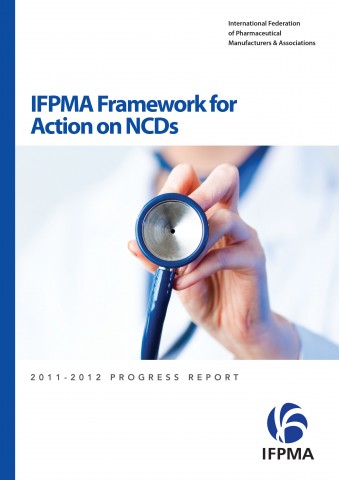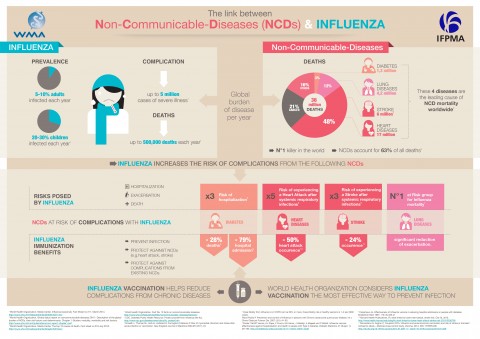IFPMA Statement, WHA 64, Item 13.12, Prevention and Control of Non Communicable Diseases
Delivered by Mr Mario Ottiglio, Associate Director, Public Affairs and Global Health Policy
Thank you on behalf of the International Federation of Pharmaceutical Manufacturers and Associations, the IFPMA, for the opportunity to provide our industry’s perspective on non-communicable diseases. The IFPMA represents the global R&D pharmaceutical industry, whose primary contribution to global health is the development of innovative medicines and vaccines.
IFPMA welcomes the Moscow Declaration from the First Global Ministerial Conference on Healthy Lifestyles and Noncommunicable Disease Control as it highlights the value of prevention and the need for all stakeholders to take responsibility for tackling this major public health challenge on a global scale.
To have a significant impact, multi-stakeholder strategies need to be fully integrated into healthcare systems and extend beyond the traditional health sector.
Data show that most of NCDs are preventable. This puts the lifestyle choices and behaviours of individuals at the core of any NCDs control strategy. Prevention can be achieved through increased health literacy; making each of us aware of the risks and effecting simple behavioural changes aimed at reducing common risk factors. The increased prevalence of NCDs poses a mounting challenge to healthcare systems worldwide and to public and private finances: investing in prevention to reduce premature mortality and morbidity will also contribute to higher economic growth and allow limited resources to be efficiently focused on patients most in need.
IFPMA Members have made tremendous contributions to human health by researching and developing successive generations of new medicines to safely and effectively treat NCDs. There are currently over 1,500 new medicines in the pipeline to treat cancer, diabetes, heart disease, asthma and mental illness; but further innovation will certainly be needed.
Besides investing in research and development of new medicines, our industry is also actively involved in ensuring that medicines for NCDs are appropriate for, and made available in, resource-poor settings. Our Members are also involved in many partnerships with governments, inter-governmental organizations and civil society to help strengthen healthcare capacity in developing countries and educate populations at risk. Finally, as strong believers in the importance of prevention, our Members have implemented workplace wellness programs that benefit over one million of employees worldwide.
We look forward to sharing our experience as a leader in innovation and delivery of medicines and to listening to the voice of other stakeholders to identify efficient, effective, and sustainable solutions to improve the health of patients today, and nurture further innovation to meet the needs of tomorrow.














